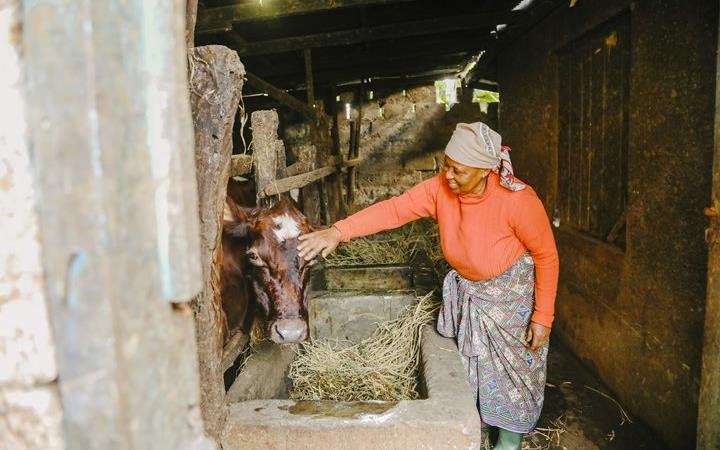A cooperative chairwoman chooses artificial insemination technology to improve production
Nancy Manase Kidini is a Tanzanian woman who’s had many roles in her life. Farmer’s daughter. Mother and grandmother. Retired attorney and local magistrate. Dairy farmer. And, chairperson of the Kalali Women’s Dairy Cooperative.
As one of six children, Nancy remembers always having cows around.
“Growing up, we had dairy cows for milk for our family, so I’ve known how to milk a cow from a very young age. And, I got my own cow – Zawadi [which means gift] when I got married in 1975. I’ve been around cows a long, long time,” Nancy said.
Like many of her neighbors, Nancy has had many opportunities over the years to learn about dairy practices, through cooperative and education programs implemented by Land O’Lakes Venture37 and by her church. These programs focused on on-farm and animal husbandry practices, and effective collection and marketing of dairy products. And, her cows, and Nancy and her family, too, have certainly benefited, with productivity per cow improving from about three or four liters of milk per day to seven, or even eight, on a good day. This new milk volume made it possible for Nancy to send all five of her children through university.

But, as chairperson of the 265-woman Kalali cooperative, Nancy knew her members and community still had a lot of work to do to improve their dairy businesses. When she learned of the Public-Private Partnership for Artificial Insemination Delivery (PAID) program, Nancy encouraged her coop to participate. She learned that on-farm practices, while very important, are just part of the puzzle in improving the productivity of the dairy sector in Tanzania. Genetic improvements to the country’s dairy herd, through careful introduction of high-producing breeds via reliable artificial insemination services, has the potential to dramatically increase milk production on farms like Nancy’s.
“Some of our members had tried using artificial insemination services before, but here in Tanzania, it’s expensive due to the need for frequent repetitions; it costs approximately 15,000 Tanzanian shillings, or $7 US per insemination. This makes our farmers opt for bulls,” said Nancy.
Through PAID, the Kalali coop was able to send a member and local private AI technician, Anita Mushi, for refresher training on AI best practices. Anita, one of over 356 Tanzanian AI technicians engaged in the PAID program, received a two-week refresher training on delivering modern, reliable AI services. And, she received a tablet and training on using new digital tools to track and report her progress – and earn incentive income based on the number of AI services she performed and live calves born.
In addition to training, PAID and private business partner ABEA equipped Anita with a motorbike, upgraded liquid nitrogen tank, and materials and videos to continue to educate her AI customers about on-farm practices like heat detection, fodder and hygienic milk collection.
Nancy was one of Anita’s first customers. And, Nancy’s a believer. In under two years, Nancy has had four calves through AI, and while all have been male, she’s been able to sell these calves for extra income. And, she’s certain that the next calf born on her farm will be female.
As Kalali coop chairwoman, Nancy has been instrumental in bringing many new projects to life for her members, including a joint venture with 13 other area cooperatives to have more scale when selling their milk and dairy products and buying farm inputs like silage. The coop also gives back to the Kilimanjaro community through their support of a local kindergarten, providing 10 liters of milk each day for the 30 students enrolled there.
Now serving her fourth – and final – three-year term, Nancy has identified her successor and is training and coaching her on how to be a strong leader. High on her list of priorities is the continued promotion of AI services.
“In my opinion, awareness and use of AI in my community is still too low. My members need more time to understand the benefits of AI in increasing milk production through improved breeding,” Nancy said.
Once retired, Nancy is looking forward to spending more time managing her farm, completing construction on the large two-story home she’s building, and attending more church services and events.
But Nancy will always have cows.
“Every woman should keep a cow,” she says. “A cow gives a woman freedom and money, so she can send her children to school and not be dependent on a man.”